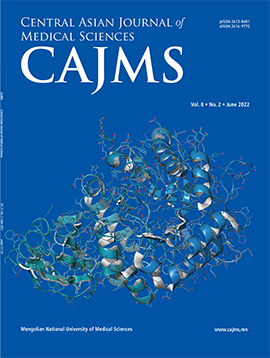The Assessment of Vitamin B1 and B12 Deficiencies in Patients with Alcohol Withdrawal Syndrome
DOI:
https://doi.org/10.24079/cajms.2019.06.003Keywords:
Alcohol Consumption, Alcohol Withdrawl, Nutrient, Thiamine, CobolamineAbstract
Objectives: We examined the oral intake and serum concentration of vitamins B1 and B12 in patients with alcohol withdrawal syndrome to determine some risk factors leading to deficiencies of those vitamins and their impact on memory function. Methods: Data were collected from patients with alcohol withdrawal syndrome admitted to 3 addiction care clinics in Ulaanbaatar. A total of 162 subjects were selected with a ratio 1:1 in this case-control study. Nutrient intake of B1 and B12 were estimated by questioning the patients regarding their food intake during the 24 hours prior to admission. Results: Drinking while hungry resulted in inadequate oral vitamin B12 consumption (OR 9.43; 95% CI 2.42;36.64, p=.001) as did refusing food while drinking (OR 4.76; 95% CI 1.23;18.30, p=.02). Inadequate B1 intake was higher in women (OR 0.16; 95% CI 0.05;0.49, p=.001) and if the patient refused food while drinking (OR 3.38; 95% CI 1.24; 9.21, p=.01). Serum B1 and B12 deficiency were associated refusing food while drinking (OR 4.53; 95% CI 1.81; 11.31, p=.001 and OR 3.43; 95% CI 1.22; 9.61, p=.01). Short term memory impairment was associated with dietary B1 and B12 deficiency (OR 8.59; 95% CI 3.10;23.82, p=.0001 and OR 3.14; 95% CI 1.02;9.61, p=.04) and low serum B12 levels (OR 2.45; 95% CI 0.98;6.11, p=.05). Long-term memory impairment was associated with deficient B12 and B1 intake (OR 19.49; 95% CI 3.19;118.86, p=.0001 and OR 4.73; 95% CI 1.91; 11.68, p=.0001) and low serum B12 and B1 levels (OR 3.32; 95% CI 1.31;8.42, p=.01 and OR 2.64; 95% CI 1.06;6.59, p=.03.)
Downloads
299
Downloads
Published
How to Cite
Issue
Section
License
Copyright (c) 2019 Mongolian National University of Medical Sciences

This work is licensed under a Creative Commons Attribution-NonCommercial 4.0 International License.




